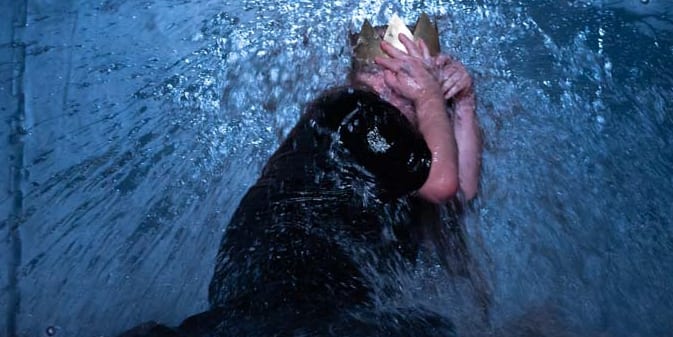In his adaptation of Shakespeare’s Richard II, Joe Hill-Gibbins channels Beckettian grotesque with great results by focusing on exaggeration and excessiveness of emotions and body language. This distancing technique removes the play’s pathos, and allows the director instead of showcasing historical nostalgia focus on human machinations in the endless and futile power game that is governing a country. Of course, according to Samuel Beckett, ‘nothing is more grotesque than the tragic’ which is apparent in this staging, too.
Simon Russell Beale leads an ensemble cast who deliver a pacey and riotous version of the play with gusto. There is freshness and almost child-like quality to the characters’ behaviour in the production. The whole stage becomes a strange playground where grown-ups play out their politics by throwing buckets of water, mud and blood on one another. The messiness of politics is already contained in the text but it is also mirrored physically onstage.
Richard II may be a rather dreary play – as it is so full of rhetoric and political conniving – although it can be very lyrical and suspenseful, too. But Hill-Gibbins and his dramaturg, Jeff James, by cutting Shakespeare’s text extensively, made it about the central conflict between the king and the usurper, Bolingbroke. There is no doubt that they see this story of political downfall and rise to power as a modern parable, bringing to mind the Conservative party current in-fighting. To achieve this, they put all actors in modern costume of t-shirts and jeans, but they also enclose them in a dark metallic box with no doors suggesting that there is no way out of the political game.
Richard II is a beleaguered leader and as the play continues, one by one, all people involved in the power struggle gang up on him, with tragic results. Beale’s body language is fantastic showing him either waver and panic or engage and confront his opponents. In fact, stage movement is brilliant throughout allowing all actors make their mark onstage, from weaselly York (excellent John Mackay) to impertinent Northumberland (feisty Robin Weaver). Also, Leo Bill as Bolingbroke stands out by offering a gangsta duke, who is rash, short-sighted and, as it turns out, not ready to take on power. In some of the best scenes with Bill, he helplessly tries to get his newly acquired court’s attention while they continue to fight like a bunch of kids.
All decisions made about stripping back and simplifying the play worked, even doubling of characters. The best costume choice, which suits the grotesque aesthetic of the production really well, was to give everyone but Richard II a pair of gloves, ranging from gardening ones to the kind that construction workers wear on building sites. It is hilarious to watch this bunch of power-hungry individuals throwing the gloves at one other, as if they were gauntlets, as a form of serious confrontation.
Thus, Almeida Theatre scores another goal, and proves that they have something new to show and say even when taking on a canonical play. Though the production’s programme was adamant this production is a Brexit story and a tale of contemporary British politics woe I think it is much more universal, it could happen anytime, anywhere. Or rather it is happening somewhere, right now. Hill-Gibbins captured the essence of Shakespeare’s play and translated it for our time and it is no mean feat.

